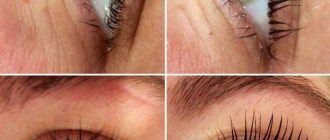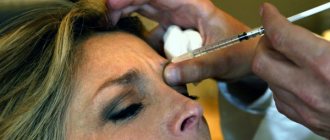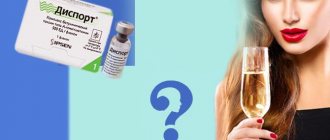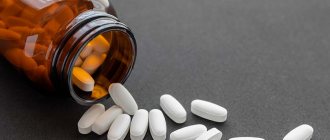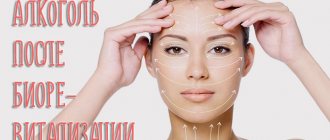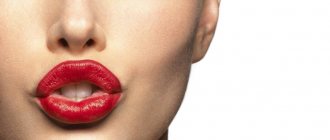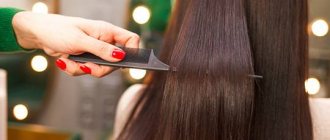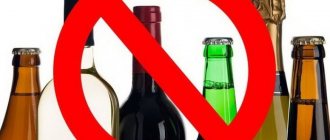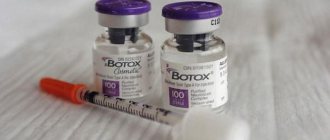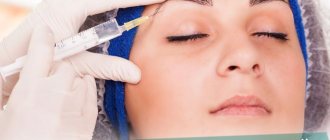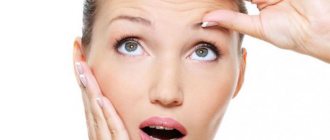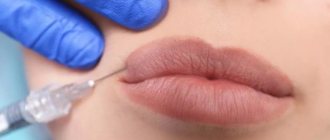Botox and alcohol are not compatible, so doctors place restrictions on the consumption of alcoholic beverages 7 days before and 2 weeks after beauty injections. Such a ban is argued by possible consequences: displacement of the drug, the formation of tubercles, the formation of hematomas, extensive swelling, and ptosis of the eyelids. And these are only the “lightest” options, because with severe intoxication, paralysis of the muscles of the face and lungs, the development of an acute allergic reaction, even angioedema, is possible.
If the doctor’s recommendations are violated, then you will need to quickly minimize the risks of interaction between alcohol and Botox - take walks in the fresh air, drink a lot of clean water. All other “measures” (taking antihistamines, drugs to relieve alcohol poisoning) are prescribed only by a doctor.
Botox and alcohol: compatibility
Botox and alcohol are absolutely incompatible, therefore, at the initial consultation with a cosmetologist, the patient receives recommendations regarding the use of strong drinks. There are clear rules that cover the following points:
- how long should you not drink alcohol before and after botulinum therapy procedures;
- how the body might react to the combination;
- what to do if drinking alcohol is unavoidable during the recovery period after Botox injections;
- what are the consequences of violating recommendations from specialists.
Mechanism of action of botulinum toxin
Why not
Here's why you can't combine Botox and alcohol:
- the combination of these two substances in the body leads to the formation of a toxic mixture, which is carried through the bloodstream to all organs and systems;
- both alcohol and botulinum toxin are essentially poisons and together have an aggressive, detrimental effect on the functionality of the body;
- a strong dilation of blood vessels occurs, which provokes not only the formation of red spots on the skin and a general increase in blood pressure, but also a displacement of the injected botulinum toxin.
The result of drinking alcoholic beverages after botulinum therapy can be:
- lack of positive results of rejuvenation, smoothing of wrinkles - may be complete or partial/insufficient;
- formation of extensive hematomas, edema, and bumps on the face;
- symptoms of general intoxication of the body - nausea, dizziness, repeated vomiting.
Expert opinion
Tatyana Somoilova
Cosmetology expert
If the body is too susceptible to toxic effects, the patient has a weakened immune system, or alcoholic beverages were drunk literally immediately after the “beauty injections,” then more serious consequences are possible - pulmonary or muscular paralysis.
In general, doctors have two opinions regarding the ban on drinking alcoholic beverages:
- Alcohol dilates blood vessels, speeds up blood flow, and the injected botulinum toxin can move from the injection site to neighboring areas. The result will be the effect of Botox on muscles other than those indicated by the doctor; as a result, pronounced ptosis of the eyelids, a “waxy face”, and “Mephistopheles eyebrows” will develop.
- Alcohol-containing drinks, due to the same dilation of blood vessels and acceleration of blood flow, provide too rapid removal of botulinum toxin. The effect of a cosmetic procedure may be mild (for example, only the smallest wrinkles will be smoothed out) or may persist for a short time. In the latter case, repeated injections will have to be carried out not after 8-10 months, but after 2-3.
Can you drink beer after Botox?
Despite the fact that beer is not a strong alcoholic drink, you should also not drink it after Botox:
- the kidneys begin to work actively - fluid is removed from the body, which can lead to partial removal of the injected botulinum toxin, as a result, the effect of the procedure may be distorted;
- even a low degree promotes vasodilation;
- beer can provoke the appearance of extensive swelling, which will take a long time to disappear and after it, bumps will probably remain on the face.
We recommend reading about how long Botox lasts. From the article you will learn how long the effect of Botox lasts, depending on the injection site and the time the drug remains in the lips. And here is more information about the benefits of Relatox injections.
Champagne after Botox
Champagne after Botox is also prohibited - alcohol enters the body, which is absorbed at high speed in the stomach due to the carbonation of the drink. Even without accompanying factors, champagne provokes headaches, dizziness, and impaired coordination of movements.
If a carbonated alcoholic drink is combined with an additional toxin, the consequences can be more serious - disruption of the central nervous system, the appearance of auditory and visual hallucinations, tremors of the upper/lower extremities, vomiting, pain in the right hypochondrium (anatomical location of the liver).
Wine after Botox
Wine after Botox is a direct path to displacement of the drug in the muscles, distorting the results . As a result, the patient will see:
- facial asymmetry;
- paralysis of muscles that should not have been injected - for example, ptosis of the upper eyelid may form;
- pronounced redness and a fine “mesh” of dilated capillaries.
Wine accelerates blood circulation as much as possible, so the likelihood of the formation of pronounced hematomas increases significantly.
Can I drink non-alcoholic beer?
Some doctors allow drinking non-alcoholic beer after Botox injections, but this process should not be accompanied by eating chips, crackers, fish - salt and spices are contraindicated during the recovery period.
It must be remembered that beer is a drink with a diuretic effect, so you need to know when to stop. Otherwise, Botox injections can have the opposite effect - existing wrinkles will become more pronounced, the skin will become dry, and areas of peeling will form.
What happens if you drink alcohol after Botox?
If you drink alcohol after Botox, the body may experience an inadequate reaction to this combination of toxins almost immediately after consumption:
- the face will become crimson/dark red;
- there will be a feeling of a rush of heat to the head;
- dizziness and nausea will appear;
- Possible severe weakness, up to “shaking in the knees.”
In the morning you can observe displacement of botulinum toxin, already formed bumps, swelling, and the appearance of subcutaneous hematomas.
Acute poisoning can result in pulmonary paralysis - spasms of the respiratory system, which cannot be relieved without specific medications, and the lack of timely medical care can lead to death from suffocation.
Watch this video about whether you can drink alcohol after Botox and what consequences you can expect:
The effect of alcohol during Botox injections
Alcohol is one of the main restrictions for beauty injections. Even an experienced cosmetologist will not be able to predict the consequences of such a combination. Botulinum toxin, although in small quantities, is still a poison. And in the chain with ethanol, a toxic mixture is formed that quickly spreads throughout the body. Alcoholic drinks do not relax, as is commonly believed. The action leads to excitation of the central nervous system, disruption of inhibition regulation processes. The work of the cardiovascular system is also activated, and the likelihood of bruising is high.
Consequences of drinking alcohol before the procedure:
- the risks of allergic reactions increase;
- the main symptoms of intoxication appear - headache, vomiting, nausea;
- in severe cases, muscular or pulmonary paralysis may occur.
All the consequences of combining alcohol and Botox injections have not yet been fully studied. Individual characteristics and the patient’s medical history also influence.
Consequences of drinking alcohol after Botox:
- excessive bleeding due to vasodilation;
- formation of edema, hematomas;
- the opposite effect of the procedure - instead of smoothing, the depth of wrinkles will increase;
- long recovery period, aggravated by painful sensations;
- headache;
- depression, sleep disturbance.
The most dangerous is instant paralysis of the respiratory system. If medical care is not provided in a timely manner, it can result in death.
Be careful! The dosage of alcohol is not always the decisive factor - the consequences depend on the individual characteristics of the body in each specific case.
How long should you drink alcohol after Botox?
It is believed that you should not drink alcohol after Botox for 14 days. This time is enough to “fix” the botulinum toxin in the muscle fibers and obtain the final result. Restrictions on the consumption of alcoholic beverages are made on an individual basis - in some cases, recovery after injections is difficult and slow, then the ban is maintained for 1 month.
How much should you drink after Botox on the forehead?
After Botox on the forehead, you should also not drink for 2 weeks, otherwise the consequences can be the most unpredictable:
- lack of rejuvenation effect;
- change in the location/shape of the eyebrows – “crying face”;
- ptosis of the upper eyelids (one or two);
- the appearance of bumps at the sites of botulinum toxin injection.
Changing the location of the eyebrows
Interaction of alcohol with hyaluronic acid
Injections of hyaluronic acid to add volume to the lips and rejuvenate the skin are a popular non-surgical cosmetic technique that can be prescribed to patients of any age and gender. Hyaluronic acid is produced by the human body, but with age its amount in soft tissues gradually decreases. As a result, the skin rapidly ages, becomes dehydrated, loses its attractive appearance, and becomes dull and thin.
Injections of hyaluronic acid help slow down the aging process and restore the lack of substance in cells. But not every patient who turns to a cosmetologist for help wonders whether alcohol is acceptable after lip augmentation with hyaluronic acid.
Alcoholic drinks, even in small doses, have a detrimental effect on the condition of internal organs and systems, promoting premature aging and thinning of the skin. Injections of hyaluronic acid help moisturize the skin and restore hydrobalance in the cells. But when the drug interacts with ethanol, the exact opposite effect occurs.
Hyaluronic acid is actively destroyed under the influence of alcohol, absorbed into connective tissues and passes into the intercellular fluid. Alcohol dries out the skin, dilates blood vessels, increasing blood circulation, as a result of which the substance is removed from the tissues more intensively.
Not every client asks their doctor whether it is possible to drink alcohol after lip augmentation with hyaluronic acid . As in the example with botulinum toxin, after surgery any alcohol-containing drinks are taboo for at least two months. If you break the rules and allow yourself even a little wine, beer or vodka during the rehabilitation period, you need to be prepared to face the following consequences:
- acute allergic response;
- dehydration, peeling, cracks in the skin;
- formation of extensive bruises at the puncture site requiring special treatment.
Alcohol before Botox
Doctors warn that you should not drink alcohol before Botox, and such restrictions apply for 2 weeks. This period is necessary for the final removal of toxic compounds from the body and the complete restoration of the functioning of all organs and systems.
It is allowed to drink alcohol-containing drinks 3-4 weeks before the intended botulinum toxin injections, but only if this “event” does not provoke an exacerbation of internal chronic pathologies.
Alcoholic drinks in combination with Botox can lead to paralysis of muscle fibers, facial asymmetry, and the formation of bumps on the surface of the skin. In some cases, drinking alcohol-containing drinks before Botox “triggers” the aging process in the body, and the result will be the appearance of new, deeper and more pronounced wrinkles.
The effect of alcohol on the body
Is it possible to drink alcohol during Botox injections between sessions when you have chosen several courses?
Perhaps this question also bothers you. But why put such tests on your body and experiment on your body? Any drug that is used to correct facial wrinkles, be it Dysport, Xeomin, Botox or Relatox, contains botulinum toxin in one quantity or another. It’s easier not to take risks and be patient.
An alternative view on the question “Can I drink after Botox injections?”
In the first part of the article, we discussed this problem from the point of view of many cosmetologists. But in many cases there is a different opinion. According to some ordinary people, the ban on drinking alcohol makes no sense, and the negative impact and negative results from the combination of alcohol and Botox are just a myth. Let's try to look at the essence from the other side.
We are sure that you have read somewhere that it is not even a matter of the “cocktail”, but the professionalism of the cosmetologist or doctor. The work of an unqualified specialist will perform poorly even without alcohol. Why then does the list of contraindications almost always include the use of alcoholic beverages? Please note that this question is of interest not only to those who have chosen Botox as a cosmetic procedure. How soon can you drink alcohol after biorevitalization, injections with hyaluronic acid or mesotherapy? Even a glass of wine or a bottle of beer triggers the process of vasodilation in the body, and strong alcohol even more so. The circulatory system begins to work more actively, and blood flow is stimulated. And on your face and body you have microscopic wounds from injections. There is no understanding of how quickly adaptation will occur and the swelling will subside in how many days. Alcohol is prohibited after Botox or biorevitalization - everything will be announced to you in the form of accessible recommendations. No one wants to make you worse, remember that.
If you have doubts and have not yet clearly answered the question of whether alcohol is allowed with Botox injections, we advise you to find out what ptosis is. This is a change in the position of the eyelid that can occur if the doctor's advice has been violated. Specialists try to protect you as much as possible from unpleasant consequences. You’re not going to ask the surgeon after the operation you’ve just had to ask if you can drink alcohol? After Botox the situation is similar. In addition, after injections, transformation occurs in the intercellular areas, fluids move more actively. And if botulinum toxin begins to leave the desired zone beyond the muscle fiber, then asymmetry or even muscle immobilization cannot be avoided.
Compatibility of alcoholic beverages with Botox analogues
Botox analogues are drugs that have an identical effect, but it may be less pronounced and have a short-term persistence. Therefore, the rules for drinking alcohol after such analogue injections will be somewhat different.
Xeomin and alcohol: consequences
Xeomin contains a low concentration of botulinum toxin, so drinking alcohol before and after injections may have the following consequences:
- displacement of the preparation and the formation of bumps and folds;
- paralysis of muscle fibers in “unauthorized” places (not at the injection site);
- distortion of facial expression - from “wax mask” to “crying face”.
“Waxy” face
The problem is that the molecules of the Botox analogue are small in size, they do not penetrate into the deep layers of muscle tissue and can “spread” without provoking factors. The superposition of the toxic effect of alcohol aggravates the situation and leads to the absence or distortion of the result.
When possible after Xeomin
After Xeomin injections, alcoholic beverages can be consumed no earlier than 30 days later - this is the recovery period after the procedure, when the drug is fixed in the muscles and begins to actively act.
Warnings regarding limiting alcohol-containing drinks before and after Xeomin rejuvenation apply to light alcohol (cocktails, tonics, champagne, etc.) and non-alcoholic beer.
Relatox and alcohol: compatibility
The compatibility of Relatox and alcohol has not been studied scientifically, but doctors warn about the following nuances:
- The Russian-made drug contains no protein stabilizers (they are replaced by gelatin), so there is no allergy to the simultaneous presence of alcohol and botulinum toxin in the body;
- the first effect after injections appears only after 7 days - this is a period of strict prohibition on the consumption of alcoholic beverages;
- The results are consolidated within 3-4 weeks - this is a conditional period - a contraindication for alcohol: if there is an emergency, then you can drink a small amount of alcohol-containing drinks.
Alcohol after Relatox
If during the first 7 days after Relatox injections there is no positive result, then alcohol should not be taken for another 3 weeks. In some patients, results will be visible only after 20-30 days, and during this time the drug actively works in the muscles at the cellular level. If you start drinking alcohol-containing drinks at this point, you may:
- muscle relaxation - ptosis of the eyelids, the formation of folds and bumps are almost guaranteed;
- displacement of the drug in the subcutaneous space;
- paralysis of muscles on the face that were not subjected to injections - facial distortion, asymmetry.
How long should you drink alcohol after Dysport?
You cannot drink alcohol after Dysport for 14 days - this restriction is due to the identical composition of the drug with classic Botox. In case of “urgent need” (birthdays, anniversaries, important meetings), doctors allow patients to drink mild alcoholic drinks in limited quantities already on the 3rd day after the procedure.
Vodka, alcohol, cognac, whiskey are strictly prohibited - they have a pronounced effect on the functioning of blood vessels, accelerate blood flow and can provoke the formation of hematomas, subcutaneous bleeding, extensive swelling, and the formation of vascular “networks”.
The effect of alcohol on other botulinum toxin preparations (Botox analogues)
According to official guidelines, alcohol should not be consumed shortly before and for some time after any botulinum toxin injections. This is true for Botox and its analogues - Dysport, Xeomin, Myoblok, Relatox and other drugs.
Due to the lack of evidence, it cannot be said that drinking alcohol has different effects on the effect of different neurotoxin preparations. Moreover, due to the individual reaction to the procedures and to the alcohol itself, the effect of such “taking on the breast” can be completely unpredictable.
On a note
There are theoretical grounds to believe that alcohol intake will have a more pronounced effect on the effect of Xeomin than on the effect of drugs based on a complex of botulinum toxin with auxiliary proteins. It is believed that Xeomin itself, due to its small molecular weight, is more mobile and more inclined to “spread” from the injection site than products with large and massive molecules. Consequently, the likelihood of increased diffusion under the influence of alcohol is presumably higher. But in fact, it was not possible to detect any difference between the pharmacodynamics of Xeomin and other drugs, and therefore such assumptions are most likely only theoretical guesses.
There is no evidence that alcohol has a different effect on the effectiveness of injections of Dysport, Xeomin and other botulinum toxin preparations.
Alcohol affects the consequences of mesobotox procedures in the same way as the effect of injecting botulinum toxins into muscles. Since the fundamental dynamics of the neurotoxin during mesobotox differ little from the distribution of this substance during classical injections, the effect of Botox on these procedures will be approximately the same (that is, up to the complete absence of such an effect).
Review:
“Somehow I didn’t notice the difference between Botox and Dysport at all. They say that Dysport is like diluted Botox; you need to inject it more for the same result. I don’t know how much they injected me, but they did it for 1000 rubles cheaper than with Botox, and the result is the same, it’s been around for 5 months and is very strong. And I wasn't careful this time. When I administered Botox, there were strictly no saunas, fitness classes, or alcohol for 10 days, but here, exactly the day before my child’s name day, I administered it, so the next day I sipped it lightly. But it didn’t affect anything.”
Oksana, Tyumen
It is also useful to read: Which is better – Botox or Xeomin and how these drugs differ from each other
Botox and alcohol: myths and reality
Botox and alcohol are such a popular topic that there are several myths that are far from reality:
- Alcohol after Botox completely neutralizes the effect of the latter. In fact, this is a myth - the drug injected into the muscle, in any case, immediately begins its paralyzing effect, so it is impossible to completely destroy the result even with a strong drink. Yes, the effect may be weakened, the result may last for a short time.
- Alcohol-containing drinks enhance the toxic effect of botulinum toxin. Botox is injected into the muscles in such small quantities that it simply does not act like a poison, alcohol does not mix with the drug, and therefore is simply not able to enhance each other’s actions. But an increase in side effects after botulinum therapy while drinking alcohol is quite possible - flu-like symptoms, nausea, vomiting, and upset stool appear.
- Alcohol can cause a powerful allergic reaction to Botox, resulting in deeper wrinkles. This is nothing more than a myth - wrinkles do not appear against the background of allergic reactions, alcohol-containing drinks do not in any way affect the functioning of the autoimmune system (it is the one that is “responsible” for the presence/absence of allergies).
Allergy to Botox
Several myths about the effect of alcohol on the effectiveness of Botox injections
There are other concerns among patients about the effect of alcohol on the effectiveness of botulinum therapy, but they are not even theoretically justified and are considered precisely as myths.
In particular, there are fears that alcohol completely neutralizes Botox, which is why the procedures turn out to be completely ineffective - after them, not only do wrinkles not disappear, but their severity does not even weaken.
In reality, alcohol cannot have this effect: if Botox gets into a muscle, the neurotoxin will still penetrate the nerve cells and act , so a noticeable effect from the procedures will appear. The complete lack of action of botulinum toxin is occasionally associated either with the individual characteristics of the body, or with improper conduct of procedures and gross non-compliance with the rules of rehabilitation after them. That is, alcohol can contribute to weakening the effect, but it is not able to completely eliminate this effect.
If the procedure is carried out correctly and botulinum toxin gets into the muscle, then the effect of the injections will be regardless of alcohol intake.
Another myth is that alcohol supposedly enhances the toxic effect of botulinum toxin. It is known that botulinum toxin is one of the strongest poisons in the world, and its introduction into the body frightens many patients. Not having a good idea of how botulinum toxin will react with the components of an alcoholic drink, many people are afraid of a possible increase in its toxic qualities.
In reality, direct interaction between botulinum toxin and the components of an alcoholic drink is practically excluded, and there is no reason to fear an increase in the “poisonous” effect of the drug. Moreover, in those microscopic doses in which it is injected into the muscles during injection.
On a note
But the really possible effect is standard poisoning with alcohol itself, sometimes against the background of side effects of botulinum therapy. It is known, for example, that after Botox injections quite often a flu-like syndrome develops with signs of general intoxication of the body, with fever and malaise. If we add to this condition the consequences of heavy libations, with nausea and vomiting, then the person’s well-being can be very unimportant.
There are other concerns as well. For example, patients believe that drinking alcohol can provoke an allergy to Botox, or will lead to the opposite of the desired effect: the severity of wrinkles will increase. These guesses have neither theoretical nor practical confirmation, and therefore can be considered typical myths.
The assertion that if the ban on drinking alcohol after Botox injections is not observed, the effect of the latter is reduced has no compelling basis.
Review:
“I don’t remember how many times I did Botox, I always followed the doctor’s instructions, everything was always as the doctor promised - I was on time, I kept the required deadlines. Once I gave in, either on the second or third day I drank a bottle of beer. And that one time Botox didn’t work at all, it had no effect at all. Then I repeated the injections - everything was fine. Then it happened that I didn’t drink wine or cognac right away, but after 5-10 days. Then the effect ended faster, I had to inject not after 6 months, as usual, but after 4. Now I don’t drink at all, I don’t even allow myself champagne, I go for injections once every 7-8 months...”
Nadia, Torrevieja
It is also useful to read: Undesirable consequences for the face from Botox injections
When can you take antibiotics after Botox?
After Botox, antibiotics can be taken only after 3-4 weeks, because these drugs can negatively affect the safety of the results of the anti-aging procedure. Violation of the recommendation will lead to the need for a repeat procedure after 2-3 months, whereas under normal conditions this occurs only after 7-8 months.
Doctors do not recommend using/taking antibacterial drugs before Botox - some of them can significantly enhance the effect of injections, as a result, facial expressions will disappear, the face will become “waxy”, and distortions may appear (for example, a deviation to the side of one of the corners of the mouth). Such undesirable consequences may occur if less than 2 weeks before the cosmetic procedure the patient took:
- drugs from the group of tetracycline antibiotics;
- magnesium sulfate;
- succinylcholine;
- lincosamides;
- polymyxins.
If a person takes antibiotics for a long time, then Botox can be administered only 2 months after complete cessation of therapy.
Alcohol after injection biorevitalization
Strong drinks after biorevitalization nullify the effect of the operation, and there is a logical explanation for this fact:
- Alcohol entering the body instantly dilates blood vessels, helping to accelerate blood circulation. The hyaluronic acid drug, together with the rapid flow of blood, can move to any place.
- Hyaluronic acid attracts water, but after drinking an alcohol-containing cocktail, excess liquid accumulates in the body and then quickly leaves it. This reduces the effect of the procedure to nothing, and causes a violation of the hydrobalance and premature aging of the epidermis.
- Alcohol disrupts the functioning of internal organs and systems and causes metabolic failure. As a result, the risk of filler retention in the blood increases, which contributes to the development of side effects in the form of voluminous papules, suppuration and other subcutaneous neoplasms that require special treatment.
Drinking strong drinks after biorevitalization makes the effect of therapy short-lived or completely unnoticeable, and also causes serious complications. Therefore, clients are forced to repeat the operation earlier than the stated deadlines. It is better, however, to give up alcohol and become the owner of young, toned, healthy skin than to then waste time and money dealing with the consequences.
How to minimize the effects of alcohol
If the ban on drinking alcoholic beverages after Botox has been violated, then you need to act quickly and minimize the influence of alcohol. Tea and coffee are not suitable for this - these drinks will only aggravate the situation, since they cannot be consumed within 1 week after the rejuvenation procedure. Effective in terms of quickly removing alcohol from the body will be:
- drinking large amounts of water - unsweetened carbonated drinks or herbal teas, compotes;
- walking in the fresh air.
It is strictly forbidden to induce vomiting - it involves bending the body, which is prohibited during the rehabilitation period. If swelling, bruising, redness at the Botox injection sites, dizziness, and nausea persist within 3 days after drinking alcohol, you should seek qualified medical help - this may indicate the development of an allergic reaction.
We recommend reading about whether you can be allergic to Botox. From the article you will learn about the symptoms of allergies to Botox for the face, hair and eyelashes, and the treatment of allergic manifestations. Read more about facial care after Botox here.
Botox and alcohol do not mix, so patients should avoid drinking alcohol before and after the procedure. As a result, the result of rejuvenation will be pronounced, will last for 7-8 months, and side effects will be avoided.
Alcohol and Botox - are they compatible?
Men and women who dream of Botox and decide to undergo this procedure repeatedly ask the following questions that concern them.
Is it possible to drink alcohol before Botox?
Answering this question, all experts recommend not drinking alcoholic beverages for at least one day before the injection, especially those that contain a high percentage of alcohol. The reason is that alcohol takes a long time to be eliminated from the body. If some portion of alcohol remains in the body, then hematomas form at the injection sites.
Based on the numerous experience of the procedures performed, it does not need to be taken for 3 days. Avoiding alcoholic beverages will improve the quality and effect of the injection.
When can you drink alcohol after Botox?
This is one of the most common questions, and here experts do not give a definite answer. It is always necessary to take into account the individuality of perception of each organism. But most cosmetologists agree that alcohol should not be consumed for at least 7 days after Botox. Otherwise, alcohol will neutralize the effect of the drug, and obtaining the desired result will become impossible.
Alcohol and Botox injections are incompatible in the body. It is necessary to limit yourself to drinking strong drinks for some time. Under their influence, the drug may not be distributed correctly under the skin. And instead of reducing the number of wrinkles, you can see bumps on the face in completely unexpected places.
Injected Botox and alcohol after the procedure are two incompatible components that will negatively affect the result and appearance. And in order not to spoil the desired effect and efforts of the cosmetologist and, most importantly, your face, you should always clarify how many days after taking Botox you should not drink alcohol. Often this period is extended to 2 weeks, based on personal abilities and body capabilities.
Why can’t you drink alcohol after Botox injections, and how does alcohol affect Botox?
Every person should take responsibly the recommendations of a cosmetologist for the sake of their health, because the basic principle of medicine is “do no harm.”
Botulinum toxin, which is the basis of the drug, relaxes the muscles. Thanks to this, wrinkles are smoothed out, the skin is tightened, and women and men look younger before our eyes. But in contact with alcohol, botulinum toxin type A produces a toxic mixture in the skin. And it spreads through the bloodstream throughout the body. This is why combining incompatible ingredients of Botox and alcohol at the same time can give unexpected results.
Possible consequences of Botox and alcohol:
- Complete or partial absence of a positive effect;
- The appearance of lumps, swelling or hematomas;
- Red spots as a response to a mixture of incompatible components;
- In particularly severe cases, muscular or pulmonary paralysis may occur;
- Possible nausea, vomiting, bleeding and dizziness;
- Intoxication.
How many days after the procedure can I drink alcohol?
Botulinum therapy is a method of correcting facial wrinkles. But it can become completely in vain if alcohol enters the body afterwards. At best, it will displace the introduced artificial proteins. But there may be more unpleasant consequences and huge lumps under the skin that persist for a long time.
Based on accumulated experience, many cosmetologists claim that 14 days is the best period when it is simply necessary to abstain from alcoholic beverages, regardless of the percentage of alcohol in them.
Can I drink alcohol after Botox on my forehead?
One of the popular procedures is Botox in the forehead and brow ridges. The facial capabilities of these facial muscles are the most expressive and involved. And if you have a dilemma about drinking alcohol after botulinum therapy or whether it’s better to postpone it, you should always choose the second option.
Read the opinion of cosmetologist Naumchik G.A. about the compatibility of alcohol with beauty injections in this video:
Consultants always describe problems associated with Botox and alcohol issues “before” and “after” the procedure. Even experienced cosmetologists cannot accurately determine who will have a reaction and what it will be like if Botox is injected before alcohol is removed from the body. They give only one piece of advice: no need to experiment on your body! And when answering numerous questions about the compatibility of Botox with alcohol, a competent and professional specialist will always answer “NO.” It should take from 3 to 14 days after the injection of the drug before drinking alcoholic beverages. And with frequently performed procedures, it is necessary to limit yourself in the consumption of alcoholic beverages.
You can find more information on this topic in the Botox section.
Useful video
Watch this video on how to quickly remove alcohol from your body:
Similar articles
- Care after Botox: procedures after injections for...
Special care after Botox is required. Basically, procedures after injections for hair, face, eyelashes, and skin involve restrictions on the use of shampoos, masks, peelings, etc. Direct preparation before Botox is also important. Read more - Botox: complications and side effects after injections...
Despite the fact that Botox injections have been done for a long time, complications are not excluded. Side effects more often appear from injections in the forehead, eyes - bruises, bumps, dents, headache, nausea, asymmetry, allergic reaction. Treatment is the introduction of an antidote, sometimes Apraclonidine helps, but more often Botox resolves on its own. Read more
- Botox procedure for the face: how the lift is performed...
Few people decide to undergo Botox for their face, because they think that it is harmful. This is wrong. It is important to know what not to do after Botox, how a facelift is performed, what scheme is used for injections, and how to take care of your face. But the way your face looks after is inspiring. Read more
- Bioreparation - a procedure for the skin: what injections...
If you decide to try bioreparation, the procedure will show fairly good results for the skin. It requires medications, and a doctor gives injections. What not to do after? What is the difference from biorevitalization? Read more
Horizontal body position
After Botox injections, you should not lie down and, especially, take a horizontal position face down for 4-5 hours after the procedure - due to a rush of blood to the head. This influx leads to vasodilation, intensification of biochemical processes in the intercellular space and in the injected muscles themselves. Because of this, part of the botulinum toxin, which has not yet had time to penetrate the nerve cells, may be inactivated, which will lead to a decrease in the effect of the injections: a smaller part of the drug will have the desired effect - therefore, the result will be less pronounced than expected.
For 4-5 hours after the procedure, you should avoid positions where blood flow to the head increases, that is, you should not lie down and bend your head down.
Another effect is also possible: due to the rush of blood to the face and the intense movement of substances in the intercellular space, the dose of botulinum toxin may partially go beyond the boundaries of the muscles into which it was injected and act on neighboring fibers that were not intended to be immobilized. As a result, noticeable cosmetic defects are possible: ptosis, raised eyebrows or both eyebrows, “waxy face.”
The likelihood of undesirable consequences if this rule is violated is quite high. After injections, botulinum toxin itself is distributed naturally in the tissues, and the rush of blood to the face is quite capable of influencing its normal distribution.
Therefore, within 4-5 hours after the injections you should either walk quietly or sit - in a car, on a sofa, in a park on a bench, in a cafe at a table. But you can’t go to bed, just lie down on the sofa or bed.
This limitation is especially relevant when injecting into the muscles near the eyes: here the spread of botulinum toxin into neighboring muscles leads to the most noticeable and unsightly side effects.
The very mechanism by which undesirable phenomena can develop in this case is generally universal. It is the risk of its implementation that is the reason for many other restrictions in the rehabilitation period.
Are alcohol and Botox compatible?
When deciding on any injections to prolong youth, a woman should be aware that there is a high probability of difficulties during the recovery period, as well as in preparation for the procedure.
Botox injections are no exception to this rule. Experts advise you to first familiarize yourself with the tactics of the manipulation, the drug used and the expected results. Only after this can a final conclusion be made about whether Botox and alcohol are combined.
The drug itself is a substance that is a toxin secreted by the bacteria Clostridium botulinum. In nature they are quite dangerous. Such microorganisms develop under anaerobic conditions. This means that they do not require oxygen to exist. Bacteria are classified as pathogenic. They provoke an extremely dangerous disease - botulism, which often ends in death in the absence of proper and timely help.
In cosmetology, weakened strains are used, so there is absolutely no chance of getting sick. However, it is unknown how a particular person’s body will react to toxins injected under the skin, so it is best to carefully listen to all the doctor’s recommendations.
Injected toxins work in or under the layers of the epidermis. Their role is to block facial muscle activity. In other words, they provoke muscle paralysis. As a result, the elasticity of the skin is restored, and small wrinkles disappear. Later, the spent botulinum toxin leaves the body, and the resulting effect pleases the woman.
Any doctor will explain that injections are a risky step, so before and after the procedure you need to give up many usual things. This list also includes alcohol consumption, since even small doses can cause unforeseen consequences. The ban is due to the poor compatibility of these two compounds. The mechanism of their interaction is not fully understood, but it’s not worth the risk. Not only beauty is at stake, but also health.
Modern cosmetology and beauty injections
Modern cosmetology does not stand still. It is constantly evolving, new drugs, techniques, and equipment appear to maintain beauty and prolong youth. Nowadays, so-called beauty injections – Botox – are common.
Some women, deciding on such a procedure, do not learn about contraindications, and cosmetologists, for the purpose of profit, simply do not talk about them. In fact, Botox is a medical drug, so such injections have their limitations.
The ideal option is to consult with an experienced cosmetologist before the procedure, take all the necessary tests and undergo an examination. In this case, all negative consequences will be minimized.
What is Botox? Botulinum toxin is a toxin that causes a blockade of impulse transmission in the muscles, due to this they relax and facial wrinkles caused by active muscle contraction are leveled. This substance is the main component of Botox.
So, are botulinum toxin and alcohol compatible, and why not (you can read reviews about this on medical websites)? All doctors will answer you in the affirmative that after such injections it is necessary to avoid drinking alcohol.
On some sites you can find information that botulinum toxin and alcohol are compatible, but you should not believe it. Botox, of course, affects specific muscle groups, but the consequences of drinking strong drinks (even a glass of wine) can be quite unpredictable.
Review of real patient reviews
Some note that drinking alcohol after Botox reduces the duration of the injection effect, literally shortens it by 2 times. Adhering to the recommended period improves the course of the rehabilitation period. The further period of Botox action, how long not to drink alcohol, is decided by the client herself. Some refuse altogether, others note that after drinking, they do not observe any consequences even on the day of the injection.
Some reviews contain a message that when combining Botox and alcohol, there were no side effects. But you should not rely on such reviews for yourself, since each person is individual, and accordingly, the body’s reaction may be different.
Whether it is possible to drink alcohol after Botox is up to each woman to decide, but it is important to remember that when you come to a cosmetologist’s office to solve one problem, after drinking there is a risk of getting many others.
If alcohol is prohibited after the procedure, it is worthwhile to accurately understand the answer to the question of whether you can drink alcohol before Botox. It is important to avoid products containing alcohol, as they have negative effects.
Compatibility of alcoholic drinks and Botox injections
Women who have undergone injection plastic surgery at least once know firsthand about its benefits.
Financial accessibility, no need for a long period of rehabilitation, a minimum of side effects and high efficiency, this is what millions of the fair sex value.
Unfortunately, many people forget about the need to follow basic safety rules, which leads to very sad and disastrous consequences. Let's talk about how Botox and alcohol combine
What is Botox and how does it work?
Most people do not think about how exactly an injection implant “works”; the end result is important to them. But if they had been concerned about this issue, it is likely that the anti-aging activities would have been postponed or even cancelled.
As for Botox, at its core it is the neurotoxin of botulism type A, only already purified and weakened. In Russian, this is an ordinary type of poison that has a direct effect on the muscles in our body.
Despite such a dangerous definition, the product has been one of the most popular in the global beauty industry for more than 20 years in a row. First of all, the drug is used to eliminate facial wrinkles, both very small and very deep.
The injection is carried out directly into the muscle, which then stops contracting. Due to this, wrinkles are smoothed out and no longer appear.
To assess the effects of Botox on the body, it will be enough information that when ingested through the esophagus, it stimulates fatal consequences, paralysis of internal organs and death. Side effects of intramuscular injection include bruising, swelling and uneven distribution of the composition.
Harm of alcoholic beverages
In modern society, probably every person knows the consequences of alcohol abuse. Alcohol-containing products are also inherently poisonous, just weaker and kill the human body gradually. The properties of alcohol also include:
- vasodilation;
- increased blood flow.
Interaction of two poisons
First of all, it is strictly not recommended to conduct such experiments and find out the possible consequences of mixing two poisons. The thing is that the body's reaction can be unpredictable. You can provoke both serious health problems and get off with slight disappointment from the lack of effect of the injection.
By the way, the most common is the second option. Alcohol after Botox provokes premature breakdown of the drug.
Under the influence of strong drinks, blood vessels expand significantly, and blood begins to circulate in them much faster than in a calm state of the body.
Increased blood movement can cause Botox to “wash out,” which reduces or completely eliminates its effectiveness.
Unpleasant consequences can be prevented if you give up alcoholic beverages. The ban must be observed for at least 14 days. At the same time, it is prohibited to visit solariums, baths, engage in active sports, bend over and massage your face.
Preparation for the procedure
Possible risks and consequences can be reduced by taking certain precautions on the eve of the injection. So, 48 hours before the procedure, certain restrictions should be observed:
- stop drinking alcohol;
- reduce physical activity as much as possible;
- If possible, do not bend over or lie face down;
- do not use new medications, especially antibiotics.
Reduce possible risks during Botox procedure
Possible consequences of drinking alcohol
Let's summarize, what can the combination of Botox and alcohol lead to in the human body during the same period? So, cosmetologists say that such carelessness can result in:
- neutralizing the effect;
- asymmetry of the result (you can simply become the owner of a distorted face);
- increased action (the muscles will completely freeze and stop moving, of course, for a while, but this is also very unpleasant);
- local, superficial manifestations (bruises, swelling, redness);
- shortening the duration of the implant (instead of the promised six months, two to three months)
The combination of alcohol and Botox leads to the most unpleasant consequences. This truism will be told to you not only by cosmetologists, but also by the patients themselves, who suffered due to their carelessness. Your maximum abstinence from alcoholic beverages will be no more than two weeks, however, by observing this limit, you will protect your health and beauty.
Recommendations from cosmetologists
After the Botox procedure, a professional cosmetologist will explain why you should not drink alcohol. The body removes alcohol from the blood within 3 days, so before injections it is necessary not to drink during these days. And within 10 days the body is rebuilt, so it is important to abstain after the procedure for the time specified by the doctor individually. If you ignore the recommendations, then the negative result will depend on the strength of the drink and its quantity.
After Botox injection, it is recommended to avoid thermal stress (saunas and steam baths) so that the result has the desired effect, and for this reason, why you should not drink alcohol, you must avoid alcohol. Although there are no obvious contraindications, why alcohol should not be used during Botox, it is better to avoid it for a while. After Botox, you can drink alcohol only after 2 weeks.
The recommendation of cosmetologists boils down to one thing: you should not experiment with your body and appearance.
What myths exist about Botox that everyone takes at face value?
Drinking alcohol
When drinking alcohol, blood vessels dilate, which leads to increased blood circulation in the area of the injected muscles. Consequently, this may contribute to the same side effects that are fraught with the horizontal position of the body after injections: either less effectiveness of Botox, or diffusion of botulinum toxin into adjacent tissues (or both at the same time).
Drinking alcohol after Botox is contraindicated, as it promotes vasodilation, which can reduce the effectiveness of the drug.
In addition, when drinking alcohol, a person’s control over his actions decreases, which is why he can perform other actions that are contraindicated after injections: rubbing his face, going to the bathhouse, going to bed, or, conversely, actively moving.
However, drinking alcohol is not as strict a restriction as, for example, a ban on lying down. The relationship between alcohol consumption and the undesirable consequences of botulinum therapy has not been clearly confirmed.
As a result, the timing of the ban on alcohol after injections of Botox and its analogues is not strictly regulated. Some doctors do not recommend drinking for a week after injections, others - for two weeks, while others generally tell patients that they can drink in moderation already on the day of the injection, especially if the drink is weak (beer or champagne, for example). There are even reviews from patients whose doctors recommended drinking a little wine after the procedure so that Botox would “better take hold.”
In most cases, cosmetologists advise refraining from drinking alcohol for 7-10 days after injections, and also not drinking for 3 days before the procedure.
What to do if you drink after Botox procedure?
Myths are spreading about the incompatibility of alcohol and Botox, allegedly alcoholic drinks neutralize the effect of the drug completely. In fact, if Botox molecules penetrate the muscles, they will definitely work. Only due to the individual characteristics of the body or if it is administered incorrectly, the drug may not work. If you drink alcohol after the Botox procedure, the effect may be weakened.
To reduce the influence of alcohol, you should not drink strong tea or coffee, or use traditional methods to cleanse the intestines. You should also avoid using medications to remove alcohol compounds. It is necessary to take a walk in the fresh air and drink more clean water.
Mechanism of action of Botox
Botox is a strong organic poison that causes muscle paralysis. The drug is based on botulinum neurotoxin type A, obtained from the bacteria Clostridium botulinum. When the substance enters the body, it destroys neuromuscular connections, as a result of which the transmission of impulses to the muscles is blocked. As a result of muscle relaxation, facial wrinkles are smoothed out.
The duration of the drug depends on the dosage, injection site, frequency of procedures and individual characteristics of the body. In most cases, the effect lasts 4 – 12 months. During this time, the drug completely leaves the body and the anti-aging effect disappears.
Botox for the face has been used in aesthetic medicine for more than 20 years. Due to the low concentration of the toxin, it is considered a fairly safe remedy, naturally, provided that the procedure is carried out by a competent and experienced specialist.
Contraindications to the use of the product
Botox is injected under the patient's skin , which entails interference in the vital functions of the body itself, although it is not a surgical intervention. In this regard, all doctors recommend finding a good doctor and a modern clinic before deciding to carry out such an intervention. Such factors can directly affect the results of Botox. The biggest advantage is the ability of this substance to smooth the skin without disrupting blood flow. But Botox also has many disadvantages :
- Possibility of diseases. The most important thing here is the high probability of getting cancer. Problems with the kidneys and respiratory tract, and vision problems are also possible.
- Combined use of Botox and alcohol.
- Such procedures are only possible from 18 to 65 years of age.
- It is strictly forbidden to work hard before and after surgery.
- Concomitant use of other medications, such as antibiotics.
- Massage the injection sites.
- Personal intolerance to toxins in patients.
- Strictly prohibited for patients with cancer.
- Undesirable for hemophilia.
- You cannot do Botox after Relatox.
These are just some of the disadvantages and contraindications that a patient may encounter before and after the injection. Therefore, a mandatory point is a consultation with a professional cosmetologist before carrying out such operations, as well as a full examination.
Possible consequences
Drinking alcohol after a Botox injection can cause a variety of complications:
- weak result of the procedure or its absence;
- the appearance of noticeable bumps, swelling, hematomas in the injection area;
- signs of intoxication – nausea, vomiting, dizziness;
- slow healing;
- severe redness in the injection area;
- the effect of a wax mask, when the muscles are so immobilized that there is practically no facial expression.
But you should not drink alcohol after Botox, not only because the result does not meet expectations. In some cases, the consequences can be extremely serious - the patient may experience pulmonary paralysis, which, in the absence of timely medical care, can cause death.
